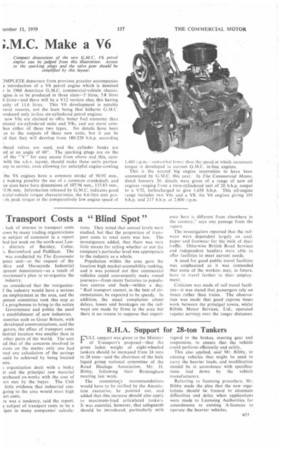Transport Costs a "Blind Spot"
Page 113

If you've noticed an error in this article please click here to report it so we can fix it.
, lack of interest in transport costs iown by many trading organizations ie subject of comment in a report lied last week on the north-east Lan: districts of Burnley, Colne, t, Barrowford and Padiham. The was conducted by The Economist ;ence unit—at the request of the shire and Merseyside Industrial vinent Association—as a result of avernment's plan to re-organize the industry.
(as considered that the reorganizaf the industry would have a serious on employment in the area, and the .pment committee took this step as f a programme to bring to the notice Government and public the need c establishment of new industries. ountries such as Great Britain, with developed communications, said the gators, the effect of transport costs lustrial location was smaller than in other parts of the world. The unit ed that of the concerns involved in sions on the matter only one had Bed any calculation of the savings ould he achieved by being located ere.
; organization dealt with a bulky ct and the principal raw material urchased ex-works with the cost of ort met by the buyer. The Unit little evidence that industrial congoing to the area would meet high ort costs.
re was a tendency, said the report, e subject of transport costs to be a spot in many companies' calcula tions. They noted that annual levels were studied, but that the proportion of transport costs to total costs was low. The investigators added, that there was very little means for telling whether or not the company's particular level was appropriate to the industry as a whole.
Population within the area gave the location high market-accessibility ranking. and it was pointed out that commercial vehicles could conveniently make round journeys—from many factories to population centres and back—within a day. "Rail transport cannot, in the best of circumstances, be expected to be speedy. In addition, the usual complaints about delays, losses and breakages on the railways are made by firms in the area but there is no reason to suppose that experi ence here is different from elsewhere in the country," says one passage from the report.
The investigators reported that the railways were dependent largely on coal, paper and footwear for the bulk of their traffic. Otherwise British Road Services and independent hauliers were able to offer facilities to meet current needs.
A need for good public travel facilities was emphasized as it was contended that some of the workers may, in future, have to travel farther to their employment.
Criticism was made of rail travel facilities—it was stated that passengers rely on buses rather than trains. The observation was made that good express buses work between the principal towns. whilst Ribble Motor Services, Ltd., operated regular services over the longer distances.




























































































































































